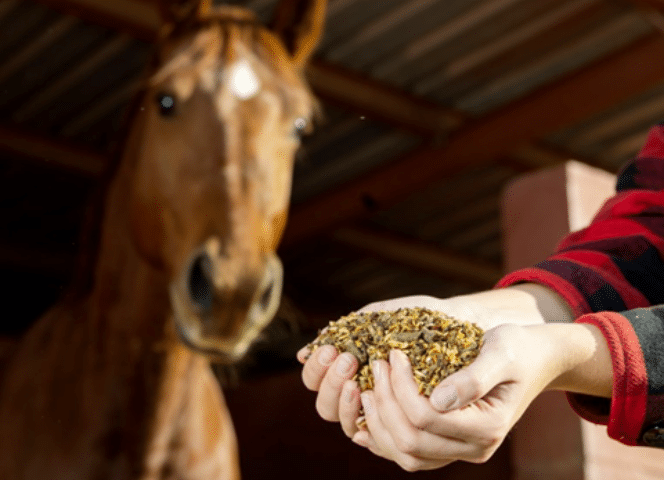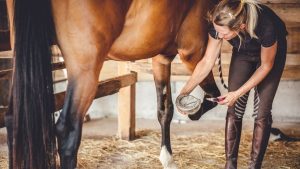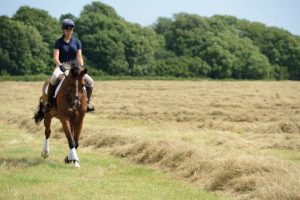Keeping your horse healthy and performing well requires more than just nutrition; it also demands attention. It requires knowledge of horse nutrition. Understanding a horse’s nutritional needs and tailoring its feed is a complex task. This comprehensive guide is intended to teach horse owners and caregivers how to optimize their horse’s nutrition. Feeding your horse is necessary, but it is also crucial to give him a balanced diet with essential nutrients. A well-planned diet should contain the right amounts of vitamins, minerals, proteins, fats, carbohydrates and other essential nutrients for health, growth and performance. This book covers the importance of each nutrient in a horse’s diet, how to assess feed quality and compatibility, and how supplements can correct nutritional deficiencies. By prioritizing your horse’s nutrition, you can improve your horse’s fitness, function, health and longevity.
1. The Importance of Roughage:
Roughage should be an important part of every horse’s diet. Eating high-quality hay and pasture is essential for your horse’s good health, as it provides the fiber necessary for good digestion. Because the type and amount of roughage depends on the horse’s age, weight, and activity level, it is crucial to tailor the roughage to the specific nutritional needs of each horse.
2. Grains and Concentrates: To Feed or Not to Feed?
Although roughage is the cornerstone of a healthy diet, some horses may need an additional source of energy. This is especially true for horses that work a lot or have special nutritional needs. Grains and concentrates can provide this energy boost; however, they should be included in the diet with caution. The fact that overfeeding grain can lead to health problems such as colic and laminitis underlines the importance of moderation and making appropriate choices based on the horse’s current health and activity level.
3. Supplements Boost Horse Nutrition:
Additionally, supplements have the potential to play a key role in addressing nutritional deficiencies in the horse’s diet, especially in minerals and vitamins that may be insufficient in feed and grains. On the other hand, not every horse needs supplements. The inclusion of these should be based on a comprehensive assessment of the horse’s current diet, age, health conditions, and performance requirements before a decision is made to introduce them.
4. Water: The Often Overlooked Nutrient
Water is undoubtedly the most important nutrient a horse needs, even though it is sometimes overlooked. Staying well hydrated is essential for digestion, maintaining a healthy body temperature, and maintaining overall health. To prevent dehydration, horses should always have access to clean, fresh water and be encouraged to drink plenty of fluids during high temperatures or after physical activity.
5. Personalized Diet to Meet Individual Needs:
It is important to remember that no two horses are the same, and neither is their diet. The age, breed, state of health, and level of activity of a horse all have an impact on its nutritional requirements. Some examples of horses with different requirements are growing foals, nursing mares, and top athletes. Other examples are geriatric horses and horses with metabolic disorders. To achieve optimal health and performance, the diet must be tailored to the specific needs of each individual.
6. Monitor Your Eating Habits and Make Adjustments:
To ensure proper nutrition is maintained, regular monitoring and changes are essential. Using a body condition score is an effective way to determine if your horse’s diet is meeting his needs. Changes in areas such as weight, performance, and general health can be indicators that dietary changes are needed. Consultation with your veterinarian or equine nutritionist can be very helpful in making these adjustments.
Conclusion:
One of the most important aspects of horse care is optimizing the horse’s nutrition, which requires careful attention, understanding of nutritional principles, and application of these principles. A balanced diet can improve a horse’s health, performance, and overall well-being by meeting its specific needs, which vary based on the horse’s age, activity level, and current health. When you take into account the latest research and seasonal adjustments, you can be assured that your diet will remain appropriate and healthy all year. Horse owners have the power to dramatically impact their horses’ quality of life by placing a high priority on forage, considering the role of grains and supplements, and ensuring their horses are adequately hydrated. Remember that the process of providing optimal nutrition to your horse is an ongoing process, guided by observation, learning, and adaptation.
FAQs:
1. How much feed should a horse consume per day?
Horses should consume one to two percent more feed per day than their body weight. This amounts to 10 to 20 pounds of feed for a 1,000-pound horse.
2. What are the symptoms of nutritional deficiencies in horses?
Inadequate coat quality, reduced performance, weight loss, and behavioral changes are all indicators of this condition. Certain defects can manifest themselves in different ways, for example, when the hoof becomes brittle or the muscles become weak.
3. If my horse is a performance breed, can I only feed him grain?
Although grains can serve as a source of additional energy, they should not be used as a substitute for feed. Nevertheless, horses that perform well still require a roughage-based diet supplemented with grains to meet their increased energy needs.
4. How often should I adjust my horse’s diet?
Make appropriate adjustments to your horse’s diet based on changes in workload, health, age, and seasonal changes. Consult a veterinary nutritionist or equine specialist regularly.
5. To what extent is it necessary to give my horse nutritional supplements?
Only when the feed and grains provided do not meet the horse’s nutritional needs or when a specific health issue is present, are supplements advised. You should always seek the advice of a trainer before using supplements.



